|
|
|
Sort Order |
|
|
|
Items / Page
|
|
|
|
|
|
|
| Srl | Item |
| 1 |
ID:
031730


|
|
|
|
|
| Publication |
London, Michael Joseph, 1987.
|
| Description |
200p.
|
| Standard Number |
0718128591
|
|
|
|
|
|
|
|
|
|
|
|
Copies: C:1/I:0,R:0,Q:0
Circulation
| Accession# | Call# | Current Location | Status | Policy | Location |
| 029904 | 355.409/LIV 029904 | Main | On Shelf | General | |
|
|
|
|
| 2 |
ID:
127616
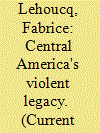

|
|
|
|
|
| Publication |
2014.
|
| Summary/Abstract |
Armed conflict liquidated Central America's dictatorships by the end of the twentieth century. Only Costa Rica was democratic when a wave of civil wars broke out in the 1970s; by the mid-1990s, every country on the isthmus had replaced dictators or military juntas with elected presidents and legislators. Every nation in the region now allows adults at least 18 years old (or 16, in Nicaragua) to cast ballots in regularly scheduled elections
|
|
|
|
|
|
|
|
|
|
|
|
|
|
|
|
| 3 |
ID:
001637


|
|
|
|
|
| Publication |
Oxford, Blackwell Publishers, 1997.
|
| Description |
xi, 298p.Hbk
|
| Standard Number |
1577180720
|
|
|
|
|
|
|
|
|
|
|
|
Copies: C:1/I:0,R:0,Q:0
Circulation
| Accession# | Call# | Current Location | Status | Policy | Location |
| 041252 | 909.82/GAR 041252 | Main | On Shelf | General | |
|
|
|
|
| 4 |
ID:
128659
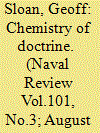

|
|
|
|
|
| Publication |
2013.
|
| Summary/Abstract |
In the second part of his series of articles, the author examines the development of naval doctrine through the 18th century, culminating in the production and publication of the fighting doctrine which informed the first world war, and governed the conduct of the battle of Jutland in 1916
|
|
|
|
|
|
|
|
|
|
|
|
|
|
|
|
| 5 |
ID:
000492
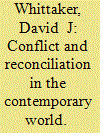

|
|
|
|
|
| Publication |
London, Routledge, 1999.
|
| Description |
xii,124p.
|
| Standard Number |
041518326X
|
|
|
|
|
|
|
|
|
|
|
|
Copies: C:1/I:0,R:0,Q:0
Circulation
| Accession# | Call# | Current Location | Status | Policy | Location |
| 041892 | 303.6/WHI 041892 | Main | On Shelf | General | |
|
|
|
|
| 6 |
ID:
124310
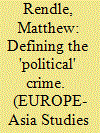

|
|
|
|
|
| Publication |
2013.
|
| Summary/Abstract |
After the October Revolution, the Bolsheviks established revolutionary tribunals to judge 'counter-revolutionary' and 'political' crimes. Amid conflicting reports from contemporaries on the effectiveness of these new courts, this essay examines their development over the first year of their existence. It argues that whilst tribunals were initially too inefficient for the regime, forcing greater central control over them, they played an important role in defining what constituted counter-revolution. In doing so, they promoted the regime's ideology, imparted an image of legality to the regime's actions, and helped the Bolsheviks to exert their control over a fragmented and diverse political landscape.
|
|
|
|
|
|
|
|
|
|
|
|
|
|
|
|
| 7 |
ID:
001173
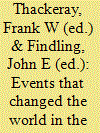

|
|
|
|
|
| Publication |
Westport, Greenwood Press, 1995.
|
| Description |
xi, 233p.Hbk
|
| Standard Number |
031329075X
|
|
|
|
|
|
|
|
|
|
|
|
Copies: C:1/I:0,R:0,Q:0
Circulation
| Accession# | Call# | Current Location | Status | Policy | Location |
| 040728 | 909.82/THA 040728 | Main | On Shelf | General | |
|
|
|
|
| 8 |
ID:
131449
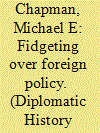

|
|
|
|
|
| Publication |
2013.
|
| Summary/Abstract |
When David Kennedy's magisterial Freedom from Fear criticizes Franklin Roosevelt's East Asian policy making it is to suggest that "a little appeasement-another name for diplomacy-might have yielded rich rewards." Some 430 pages earlier, Kennedy passed over the Stimson Doctrine, except to attribute its "timid" stance to isolationist public opinion, stressing instead how, "On the wind-scoured plains of Manchuria, Japan thus set the match in 1931 to the long fuse that would detonate the attack on Pearl Harbor." By setting aside what I call Tenaka teleology to concentrate on the psychological and ideological reasons for Henry Stimson's persistent interventionism following the Mukden (Shenyang) Incident, this article seeks to build on Kennedy's intimation that diplomatic appeasement could have slowed, detoured, or even stopped the Japanese juggernaut. After emphasizing Stimson's initial inaction, and then showing how U.S. diplomats and State Department officials-Stimson included-approved of Japan's involvement in Manchuria and sympathized with its difficulties there, this article argues that far from leaving well alone as realpolitik sensibilities demanded, Stimson acted instead to satisfy a string of personal affronts to his honor. God-fearing American elites, in his understanding, shouldered the responsibility of extending civilization westward, into Asia. As Secretary of State for the nation so charged by providence, Stimson internalized his role as the arbiter of moral behavior. Upstart Orientals running amok in the Pacific, particularly when they claimed to emulate Americans, roiled the order he felt it was his duty to police, offending his sense of self and jeopardizing his legacy.
|
|
|
|
|
|
|
|
|
|
|
|
|
|
|
|
| 9 |
ID:
133274
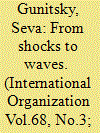

|
|
|
|
|
| Publication |
2014.
|
| Summary/Abstract |
What causes democratic waves? This article puts forward a theory of institutional waves that focuses on the effects of systemic transformations. It argues that abrupt shifts in the distribution of power among leading states create unique and powerful incentives for sweeping domestic reforms. A variety of statistical tests reveals strong support for the idea that shifts in hegemonic power have shaped waves of democracy, fascism, and communism in the twentieth century, independent of domestic factors or horizontal diffusion. These "hegemonic shocks" produce windows of opportunity for external regime imposition, enable rising powers to rapidly expand networks of trade and patronage, and inspire imitators by credibly revealing hidden information about relative regime effectiveness to foreign audiences. I outline these mechanisms of coercion, influence, and emulation that connect shocks to waves, empirically test their relationship, and illustrate the theory with two case studies-the wave of democratic transitions after World War I, and the fascist wave of the late interwar period. In sum, democracy in the twentieth century cannot be fully understood without examining the effects of hegemonic shocks
|
|
|
|
|
|
|
|
|
|
|
|
|
|
|
|
| 10 |
ID:
001731
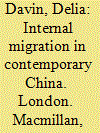

|
|
|
|
|
| Publication |
London, Macmillan, 1999.
|
| Description |
xx,178p.
|
| Standard Number |
0-312-21718-8
|
|
|
|
|
|
|
|
|
|
|
|
Copies: C:1/I:0,R:0,Q:0
Circulation
| Accession# | Call# | Current Location | Status | Policy | Location |
| 041342 | 304.80951/DAV 041342 | Main | On Shelf | General | |
|
|
|
|
| 11 |
ID:
131451
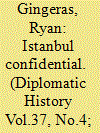

|
|
|
|
|
| Publication |
2013.
|
| Summary/Abstract |
This article provides an intimate survey of the construction and early evolution of one element of America's security relationship with Turkey: the development of joint counter-narcotics operations in the city of Istanbul. In exploring how American officials came to influence the policing of narcotics trafficking in Turkey's largest city between the years 1948 and 1960, this piece hopes to contribute to two specific historiographical issues. First, the research presented here adds to the growing body of literature on the history of U.S. antinarcotics policies on the world stage. Secondly, it attempts to shed new light on the relationship between Turkey's narcotics economy and the evolution of the modern Turkish state. A close reading of how both Turkish and American officials approached narcotics trafficking at this stage in the Cold War affirms the degree to which law enforcement officials (particularly in counter-narcotics efforts) constrained their efforts for the sake of larger national security prerogatives. The case present here in this article provides instructive examples of how the so-called "war on drugs," even at this embryonic stage, ultimately served to promote American hegemony in Turkey and beyond.
|
|
|
|
|
|
|
|
|
|
|
|
|
|
|
|
| 12 |
ID:
133824
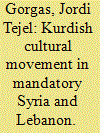

|
|
|
|
|
| Publication |
2014.
|
| Summary/Abstract |
In the late nineteenth and early twentieth centuries diverse, and sometimes competing, movements of cultural renaissance emerged in the Middle East. Within this context, the Kurdish cultural renaissance in the Kurmanji dialect appeared relatively late and moreover its fruits were curtailed by two major events: the First World War and the establishment of the Turkish republic. From 1923 onwards, the task of animating the Kurdish cultural renaissance fell on the Kurds exiled first in mandatory Syria and Lebanon and then in Europe. In exile, Kurdish intellectuals benefited from some advantageous conditions such as freedom of speech and organization. Yet Kurdish intellectual endeavors in the Levant were to face political, social and economic challenges. Using French records and Kurdish newspapers, this article explores both the opportunities and the constraints for the consolidation of the Kurdish cultural renaissance under colonial rule. In doing so, the article intends to enrich the debate on the formation of nationalisms in the interwar era on the one hand, and the relationship between colonial powers and minorities in the Middle East, on the other.
|
|
|
|
|
|
|
|
|
|
|
|
|
|
|
|
| 13 |
ID:
131463
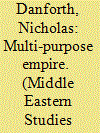

|
|
|
|
|
| Publication |
2014.
|
| Summary/Abstract |
This article examines popular, academic and political perceptions of the Ottoman Empire in Republican Turkey, challenging the widespread assumption that there has been a continuous clash between pro-Ottoman Islamists and secular, anti-Ottoman, Kemalists. It argues that in the Republican period Kemalists effectively appropriated the Ottoman past for use in their nationalist narrative, not only through using a 'theory of fatal decline' but also by simply defining positive cultural or political symbols from the years 1299 to 1923 as 'Turkish' rather than 'Ottoman'. This serves as a backdrop for the article's main argument, that the 1940s and 1950s saw a thorough Kemalist appropriation of the Ottoman past, celebrating the empire's golden age as secular, pro-western and Turkish. The 500th anniversary of the conquest of Istanbul in 1953 gave the Turkish government an opportunity to showcase this new interpretation of Ottoman history as well as to use the relatively new rhetoric of 'Ottoman tolerance' to claim for Turkey a place among its new allies in the democratic, anti-communist West. At the level of domestic politics, the Democratic Party sought to wrap its modernization policies in the mantle of a progressive, democratic Fatih Sultan Mehmet II, while the Republican People's Party condemned the Democrats for betraying Fatih's memory and the nation's honour by downplaying the Ottoman past in order to placate potential anti-communist allies in Greece and the Arab world. Ultimately, the article argues that it is impossible to understand contemporary Islamist and liberal uses of the Ottoman past without understanding the way the empire was incorporated into the dominant Turkish nationalist narrative between 1923 and 1953
|
|
|
|
|
|
|
|
|
|
|
|
|
|
|
|
| 14 |
ID:
128492
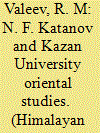

|
|
|
|
|
| Publication |
2013.
|
| Summary/Abstract |
This paper gives an appraisal of Katanov, one of the outstanding founders of Kazan University School of orientalism in the second half of nineteenth and early twentieth centuries. Professor N. F. Katanov is one of the bright and ?amboyant national scholar-thinkers, outstanding representatives of Russian science, education and culture. His life journey and activity reflected important events and tendencies of indigenous and oriental studies. N. F. Katanov's multifarious scientific and pedagogic activity is an unquestionable evidence of great achievements of indigenous orientalism at the turn of nineteenth-twentieth centuries. And his contribution to the development of Kazan oriental studies in this period is indeed invaluable. Since his studentship in Petersburg (1884-1888), his expedition to Southern Siberia and Eastern Turkestan (1889-1892) and tutorage in Kazan (1894-1922), N. F. Katanov's orientalistic activity is connected with complex research of languages, ethnography, folklore and generally spiritual life of the Turkic peoples in Sayan-Altai, Xinjiang, Volga region and Transurals. He had great in?uence on the development of indigenous Turcology in this period.
|
|
|
|
|
|
|
|
|
|
|
|
|
|
|
|
| 15 |
ID:
133822
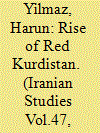

|
|
|
|
|
| Publication |
2014.
|
| Summary/Abstract |
Current literature on twentieth century Kurdish history overwhelmingly covers Kurdish populations and national movements within the borders of Turkey, Iran, Iraq and Syria. This article, hoin Armenia, Georgia, and Azerbaijan,ever, focuses on Soviet Kurdistan and Kurdish policy in Azerbaijan between 1920 and 1937 through the broader question of national minorities within the republic. It is claimed here that the Soviet policy on Azerbaijani Kurds was part of a multilayered issue. First of vnall, the Kurds of Azerbaijan were semi-nomadic mountain dwellers transformed by the modernization policies implemented in Soviet territories. Azerbaijani Kurds were a national identity within the Soviet Union and thus subject to ethnophilic All-Union policies in those years. Finally, Kurds were one of the numerous national minorities in the Soviet Socialist Republic of Azerbaijan who were exposed to the national minority policies executed within the republic by the administration in Baku. The national minority policy in Azerbaijan was often contested and limited by local conditions and obstacles. Therefore, the granting of cultural rights in the 1920s to national minorities, which included the Kurds of Azerbaijan, the promotion of these rights in the 1920s and 1930s, and opposition to these policies can only be examined with regard to these three layers.
|
|
|
|
|
|
|
|
|
|
|
|
|
|
|
|
| 16 |
ID:
129679
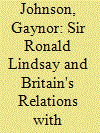

|
|
|
|
|
| Publication |
2014.
|
| Summary/Abstract |
Of the five diplomats who held the post of British ambassador to Berlin during the interwar period, the two-year embassy of Sir Ronald Lindsay, 1926-1928, has received least attention by historians. This article charts three main aspects of Lindsay's career in Berlin. The first of these is his relationship with the Foreign Office, which is consistently good although Treasury comments on his reports about Germany's continuing financial problems expose some of the friction within the British government about how best to deal with the German reparation problem. The second area explored by the article examines Lindsay's views on the "German question," and suggests that the post-Locarno period did not witness a significant growth of trust between Britain, France and Germany on questions concerning international security. Finally, the article examines how Lindsay's thinking about German affairs compares to his predecessor and his successors and explores Lindsay's views about the likely trajectories of German foreign policy.
|
|
|
|
|
|
|
|
|
|
|
|
|
|
|
|
| 17 |
ID:
131561
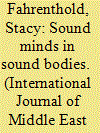

|
|
|
|
|
| Publication |
2014.
|
| Summary/Abstract |
Established in 1920, al-Nadi al-Homsi in São Paulo, Brazil was a young men's club devoted to Syrian patriotic activism and culture in the American mahjar (diaspora). Founded by a transnational network of intellectuals from Homs, the fraternity committed itself to what it saw as a crucial aspect of Syrian national independence under Amir Faysal: the development of a political middle class and a masculine patriotic culture. Al-Nadi al-Homsi directed this project at Syrian youth, opening orphanages, libraries, and schools in both Syria and in Brazil. In these spaces, men and boys congregated to celebrate a polite male culture centered on secular philanthropy, popular education, and corporeal discipline through sports. This article argues that during the 1920s and 1930s, al-Nadi al-Homsi's politics of benevolence was part of a larger social milieu that drew analogies between strong Syrian minds and bodies and a sovereign, independent Syrian homeland.
|
|
|
|
|
|
|
|
|
|
|
|
|
|
|
|
| 18 |
ID:
124295
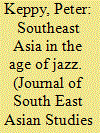

|
|
|
|
|
| Publication |
2013.
|
| Summary/Abstract |
Referencing insights from Cultural Studies and taking a jazz-age perspective, this essay aims to historicise and 'locate the popular' in colonial Indonesia and the Philippines. A new cultural era dawned in the 1920s urban hubs of Southeast Asia, associated with the creation of novel forms of vernacular literature, theatre, music and their consumption via the print press, gramophone, radio broadcasting and cinema. By investigating the complex relationship between the elusive phenomena of modernity, cosmopolitanism and nationalism as articulated by two pioneering artists active in commercial music and theatre, the social significance of popular culture is scrutinised.
|
|
|
|
|
|
|
|
|
|
|
|
|
|
|
|
| 19 |
ID:
128761
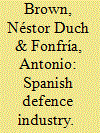

|
|
|
|
|
| Publication |
2014.
|
| Summary/Abstract |
In Spain, the existence of industries devoted to the production of military equipment dates back to the thirteenth century. The success of the Spanish empire of the sixteenth and seventeenth centuries can be explained, in part, by the early production of battleships, fire guns, gunpowder and explosives, artillery pieces, and swords. Some of the factories created during this period of history are still in operation today, although deeply transformed and integrated within larger and modern organizations.
|
|
|
|
|
|
|
|
|
|
|
|
|
|
|
|
| 20 |
ID:
031731
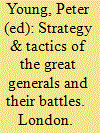

|
|
|
|
|
| Publication |
London, Bison Books Corp, 1984.
|
| Description |
256p.
|
| Standard Number |
0861241959
|
|
|
|
|
|
|
|
|
|
|
|
Copies: C:1/I:0,R:0,Q:0
Circulation
| Accession# | Call# | Current Location | Status | Policy | Location |
| 028207 | 355.409/YOU 028207 | Main | On Shelf | General | |
|
|
|
|
|
|
|
|
|